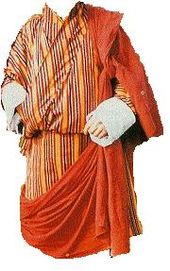Kabney


A kabney (Dzongkha: བཀབ་ནེ་, Wylie: bkab-ne) is a silk scarf worn as a part of the gho, the traditional male attire in Bhutan.[1] It is raw silk, normally 90 cm × 300 cm (35 in × 118 in) with fringes. Kabney is worn over the traditional coat gho; it runs from the left shoulder to the right hip, and is worn at special occasions or when visiting a dzong. Kabney is also referred as Bura, which means wild silk.
The use of gho and kabney is encouraged in Bhutan as a part of driglam namzha (or driklam namzhak), the official code of etiquette and dress code of Bhutan. Gho is compulsory for schoolboys and government officials.[1][2] The female traditional dress is called kira; a rachu is worn over the traditional dress kira.[1][3]
The rank and social class of the bearer determines the permissible color of the scarf:[4][2][5][6]
- Saffron scarf for the Druk Gyalpo (king) and the Je Khenpo (chief abbot).
- Orange scarf for Lyonpos (ministers and other members of the government).[2]
- Red scarf for Dashos (male members of the royal family and higher officials).[2] The red scarf can also be conferred upon Bhutanese civilian, as it is one of highest honors a Bhutanese civilian can receive, and comes directly from the throne in recognition of an individual's outstanding service to the nation.[7]
- Green scarf for judges.
- Blue scarf for members of parliament.[8]
- White Scarf without fringes for Secretary of various Ministries and Zimpoen to His Majesty The King. Also awarded to distinguished individuals for various achievements and contributions. [9]
- White scarf with red stripes for Gups (headmen of the 205 gewogs).[10]
- White scarf for ordinary citizens.[11]
Former scarf ranks include:
- White scarf with blue stripes for Chimi (members of the National Assembly). This is now used for Thrompoens, the head of Thromde.
- Blue scarf for Lodoe Tsoggde (members of the Royal Advisory Council, now defunct).[2]
References
[edit]- ^ a b c Gyurme Dorje. Footprint Bhutan. Footprint, [2004]. ISBN 1-903471-32-X. Section "National dress", p 261
- ^ a b c d e Kabney & Patang; from the blog "Bhutan Land Of The Thunder Dragon" by Yeshey Dorji
- ^ Bhutan Majestic Travel Archived 2016-10-08 at the Wayback Machine
- ^ Kabney colour mania Archived 2017-07-13 at the Wayback Machine; bhutanobserver.bt, August 19, 2011
- ^ The Symbolism of Kabney and Rachu in Bhutan; blog "Asian University For Women Academic Reading/Writing 2011"
- ^ Bhutanese Society and Dress; Bhutan Life Exposure Tours & Treks
- ^ "Four individuals conferred Bura Maap - BBS". Bbs.bt. 17 December 2012. Retrieved October 15, 2020.
- ^ Blue Kabney (Scarf) for members of parliament Archived 2016-06-17 at the Wayback Machine; bhutanmajestictravel.com
- ^ http://ccouc.org/ccouc-lunch-time-seminar-educating-for-gross-national-happiness-a-new-paradigm-for-education-in
- ^ His Majesty grants dhar and kabney to the Gups; bbs.bt
- ^ Time for the white kabney Archived 2015-08-25 at the Wayback Machine; bhutanobserver.bt, May 3rd, 2013
